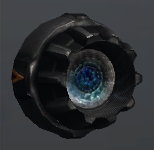Difference between revisions of "Jet engine"
m (Jet engine thrust depends on speed, not altitude, see velocityCurve in part.cfg's. Isp depends on altitude.) |
(+integrated general stuff from both engine articles;) |
||
| Line 1: | Line 1: | ||
[[Image:JetEngine.png|right|thumb|A jet engine from KSP 0.18]] | [[Image:JetEngine.png|right|thumb|A jet engine from KSP 0.18]] | ||
| − | A '''jet engine''' is an air-breathing engine which uses onboard fuel and combusts it with the oxygen drawn from the atmosphere. Due to the lower air pressure at higher altitudes its thrust output varies accordingly. | + | A '''jet engine''' is an air-breathing engine which uses onboard [[liquid fuel]] and combusts it with the oxygen drawn from the [[atmosphere]]. Due to the lower air pressure at higher altitudes its thrust output varies accordingly. |
== Usage == | == Usage == | ||
| − | Unlike rocket | + | Unlike [[rocket engine]]s, a jet draws oxygen from the atmosphere rather than taking it from an on-board tank. This is represented in-game by a much lower rate of fuel consumption. Depending on the aircraft, jet engines can produce thrust at altitudes greater than 20 km. Jet engines do not perform in the same manner as rocket engines. Since Jet engines rely on a turbine to compress fuel and atmosphere together in order to produce thrust, it takes time to change speed. Also if the [[throttle]] or air flow are too low the engine will stall. By contrast, rocket engines give instant response to control input. |
| − | As of [[Version_History#v0.18.0|version 0.18]] jet engines require air to run, provided by [[air intake]]s. | + | As of [[Version_History#v0.18.0|version 0.18]] jet engines require [[intake air]] to run, provided by [[air intake]]s. Jet engines don't consume [[oxidizer]], so the use of [[liquid fuel tank]]s is very wasteful because they come with an full oxidizer tank adding additional mass. |
== Advantages == | == Advantages == | ||
Revision as of 14:46, 2 September 2013
A jet engine is an air-breathing engine which uses onboard liquid fuel and combusts it with the oxygen drawn from the atmosphere. Due to the lower air pressure at higher altitudes its thrust output varies accordingly.
Usage
Unlike rocket engines, a jet draws oxygen from the atmosphere rather than taking it from an on-board tank. This is represented in-game by a much lower rate of fuel consumption. Depending on the aircraft, jet engines can produce thrust at altitudes greater than 20 km. Jet engines do not perform in the same manner as rocket engines. Since Jet engines rely on a turbine to compress fuel and atmosphere together in order to produce thrust, it takes time to change speed. Also if the throttle or air flow are too low the engine will stall. By contrast, rocket engines give instant response to control input.
As of version 0.18 jet engines require intake air to run, provided by air intakes. Jet engines don't consume oxidizer, so the use of liquid fuel tanks is very wasteful because they come with an full oxidizer tank adding additional mass.
Advantages
- Provides excellent fuel efficiency within an atmosphere
- All current jet engines provide thrust vectoring for greater maneuverability
- Excellent power to weight ratio
Disadvantages
- Cannot be used outside of an atmosphere that contains oxygen. In current version, it means they only function on Kerbin and Laythe.
- Thrust output changes depending on speed
- Engine requires time to spool up to maximum thrust potential
Available jet engines
| Image | Part | Radial size | Cost ( |
Mass (t) |
Max. Temp. (K) |
Tolerance (m/s) |
Tolerance (g) |
Thrust (kN) |
TWR | Fuel ( |
Intake ( |
Isp (s) | TVC (°) |
Reverse |
|---|---|---|---|---|---|---|---|---|---|---|---|---|---|---|
| J-20 "Juno" Basic Jet Engine | Tiny | 450 | 0.25 | 2 000 | 7 | 50 | 20.0 Mach 0 20.6 Mach 1.3 |
8.16 Mach 0 8.40 Mach 1.3 |
0.064 | 1.402 | 6 400 | — | No | |
| J-33 "Wheesley" Turbofan Engine | Small | 1 400 | 1.5 | 2 000 | 7 | 50 | 120.0 Mach 0 | 8.16 Mach 0 | 0.233 | 29.601 | 10 500 | — | Yes | |
| J-404 "Panther" Afterburning Turbofan | Small | 2 000 | 1.2 | 2 000 | 7 | 50 | 85.00 Mach 0 107.89 Mach 1.75 / 130.00 Mach 0 219.48 Mach 2.5 |
7.22 Mach 0 9.17 Mach 1.75 / 11.05 Mach 0 18.65 Mach 2.5 |
0.193 / 0.663 |
7.705 / 7.954 |
9 000 / 4 000 |
10.0 | No | |
| J-X4 "Whiplash" Turbo Ramjet Engine | Small | 2 250 | 1.8 | 2 000 | 7 | 50 | 130.00 Mach 0 386.66 Mach 3.0 |
7.36 Mach 0 21.90 Mach 3.0 |
0.663 | 5.303 | 4 000 | 1.0 | No | |
| J-90 "Goliath" Turbofan Engine | Radial mounted | 2 600 | 4.5 | 2 000 | 7 | 50 | 360.0 Mach 0 | 8.16 Mach 0 | 0.583 | 132.273 | 12 600 | — | Yes | |
| CR-7 R.A.P.I.E.R. Engine[Note 1] | Small | 6 000 | 2.0 | 2 000 | 20 | 50 | 105.00 Mach 0 465.64 Mach 3.75 |
5.35 Mach 0 23.74 Mach 3.75 |
0.669 | 4.015 | 3 200 | 3.0 | No |
- ↑ The R.A.P.I.E.R. Engine is a combination of liquid fuel and jet engine. Only the jet engine properties are shown.
See also
- Jet engine on Wikipedia




